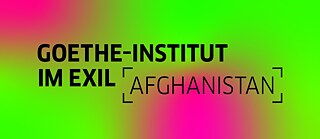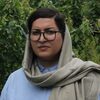|
7:30 PM-8:30 PM
Shar-e Naw in Berlin
Theatre Performance | with Mina Jawad und Torkan Omari, Shamayel Shalizi und Hewád Laraway
-
ACUD Theater, Berlin
- Language English, Dari, German, Pashto
- Price free entrance; Reservation of a free ticket via this link is recommended
- Part of series: Festival Goethe-Institut in Exile Afghanistan

Set against the vibrant backdrop of Berlin's Kreuzberg district, "Shar-e Naw in Berlin" is about two Afghan women, Nasrin and Spozhmai, both negotiating their personal and perceived identities.
The plot develops when Nasrin, an Afghan migrant in Germany, visits her friend Spozhmai, who lives in exile in Berlin. Their differences in appearance and positioning shape their relationship and provide a situational picture of diversity within the Afghan diaspora. An otherwise typical evening in the city quickly turns into a profound exploration of their identities against the backdrop of colonised norms, prejudices and stereotypes.
"Shar-e Naw in Berlin" explores themes of queerness and the Male Gaze, identity negotiations, respectability politics, elitism, misogyny and frictions between diaspora and exile. The lively exchanges, personal and highly political conflicts and surprising encounters between Nasrin and Spozhmai take them through the city's nightlife and encourage the audience to rethink their view of Afghan women and the migrant experience. Over the course of the evening, Nasrin and Spozhmai transform from observers to determiners in a world where they are often judged based on their appearance and their disregard for traditional gender norms.
The title "Shar-e Naw" (شرِ نو) alludes to "Shahr-e Naw" (شهر نو) or "New Town", which refers to a fashionable neighbourhood in Kabul known for its decadent parties before the Taliban took power in August 2021. Afghan women who attended events there often faced the negative stigma of being considered unattached. In this context, 'shar' (شر), meaning 'wicked', conveys a sense of wickedness, a label often attributed to women who reject social norms. In line with the migrant experience and Afghanistan's multilingualism, words and phrases are occasionally spoken in four languages - German, Pashto, English and Dari, with an emphasis on English and Dari.
Tickets
Mina Jawad is a freelance writer, educational consultant and trainer with a focus on the postcolonial deconstruction of space and gender. Her work ranges from prose and satire to columns and discourse as performance. Her publications often reflect the context of Afghanistan and aspects of diaspora and exile.
Torkan Omari is an actress, writer and filmmaker. She is currently studying for a Master's degree in Acting at the University of California San Diego. Her work is a meditation on the human, the female and the refugee body on planet Earth.
The plot develops when Nasrin, an Afghan migrant in Germany, visits her friend Spozhmai, who lives in exile in Berlin. Their differences in appearance and positioning shape their relationship and provide a situational picture of diversity within the Afghan diaspora. An otherwise typical evening in the city quickly turns into a profound exploration of their identities against the backdrop of colonised norms, prejudices and stereotypes.
"Shar-e Naw in Berlin" explores themes of queerness and the Male Gaze, identity negotiations, respectability politics, elitism, misogyny and frictions between diaspora and exile. The lively exchanges, personal and highly political conflicts and surprising encounters between Nasrin and Spozhmai take them through the city's nightlife and encourage the audience to rethink their view of Afghan women and the migrant experience. Over the course of the evening, Nasrin and Spozhmai transform from observers to determiners in a world where they are often judged based on their appearance and their disregard for traditional gender norms.
The title "Shar-e Naw" (شرِ نو) alludes to "Shahr-e Naw" (شهر نو) or "New Town", which refers to a fashionable neighbourhood in Kabul known for its decadent parties before the Taliban took power in August 2021. Afghan women who attended events there often faced the negative stigma of being considered unattached. In this context, 'shar' (شر), meaning 'wicked', conveys a sense of wickedness, a label often attributed to women who reject social norms. In line with the migrant experience and Afghanistan's multilingualism, words and phrases are occasionally spoken in four languages - German, Pashto, English and Dari, with an emphasis on English and Dari.
Tickets
Mina Jawad is a freelance writer, educational consultant and trainer with a focus on the postcolonial deconstruction of space and gender. Her work ranges from prose and satire to columns and discourse as performance. Her publications often reflect the context of Afghanistan and aspects of diaspora and exile.
Torkan Omari is an actress, writer and filmmaker. She is currently studying for a Master's degree in Acting at the University of California San Diego. Her work is a meditation on the human, the female and the refugee body on planet Earth.
Location
ACUD Theater
Veteranenstraße 21
10119 Berlin
Germany
Veteranenstraße 21
10119 Berlin
Germany
Location
ACUD Theater
Veteranenstraße 21
10119 Berlin
Germany
Veteranenstraße 21
10119 Berlin
Germany

